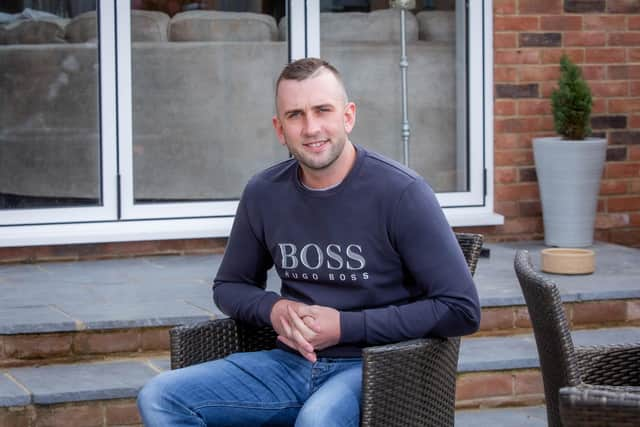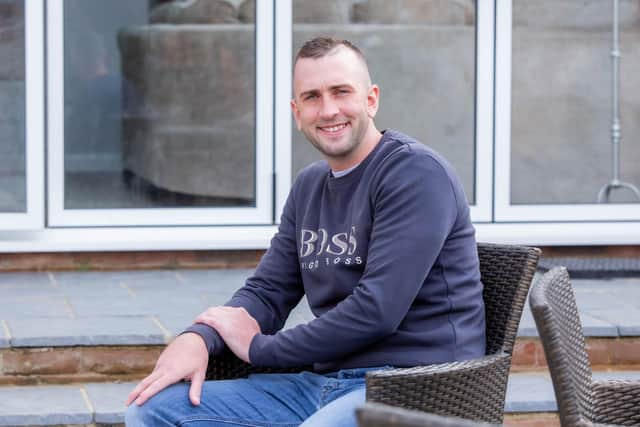Stubbington man praises 'phenomenal' NHS staff who saved his life after extremely rare reaction to the Oxford AstraZeneca Covid-19 vaccine
and live on Freeview channel 276
Jamie Roe 28, is ‘happy to be alive’ after complications linked to the first dose of the AstraZeneca Covid-19 vaccine led to a seizure and permanent brain damage.
Thousands of pounds have been raised for Southampton General and Queen Alexandra Hospitals from Jamie telling the story of the ‘incredible’ care he received after a blood clot formed on his brain.
Advertisement
Hide AdAdvertisement
Hide AdJamie, who still thinks the benefits of the vaccine far outweigh the risks, had four days of extreme headaches before going to the Cosham hospital’s accident and emergency department.


A two-minute seizure led to Jamie being rushed to Southampton General Hospital, where his critical condition was stabilised during a two-week stay and he was taught to walk again.
As a token of his appreciation for the ‘amazing’ health service, Jamie has launched a fundraising campaign to support the two hospitals and plans to take on a 40-mile bike ride when his health allows.
Jamie said: ‘It’s a good job I went to hospital because if I’d had that seizure at home, I potentially would have died so they saved my life.


Advertisement
Hide AdAdvertisement
Hide Ad‘I can’t remember all the nurses’ names but every single person from the catering staff to the highest level of doctors there were incredible.
‘They let me keep my privacy and dignity. Two weeks before that I was living a completely normal life, I was independent. My life has just been turned upside down.’
On receiving the vaccine, Jamie said: ‘I do think the benefits far outweigh the risks and don’t want to scare people into not having it, it was really rare and unfortunate what happened to me.’
When Jamie first woke up in Southampton General Hospital’s intensive care unit, he was scared and confused - with his distress worsening when he realised he could not move his arms or legs.
Advertisement
Hide AdAdvertisement
Hide AdHe was not aware at this point, but his family had been told his life could go either way and he was in a very critical condition.
Jamie began getting the feeling back in his arms and legs, and thanks to the kindness and patience of staff he learned to eat with his hands again, and then took his first shaky steps in the hospital’s gym.
Jamie, who was taking up to 40 tablets each day, said: ‘As a man, there’s a perception that you don’t cry and show your feelings but being in there and thinking two weeks before I was normal broke me.
‘I remember getting up and I couldn’t physically move my legs. I broke down and I was so angry.
Advertisement
Hide AdAdvertisement
Hide Ad‘Within 10 minutes I started to be able to shift my leg, but I couldn’t remember how to walk. I was very emotional.’
Despite feeling scared and frustrated, Jamie’s experience in hospital was overwhelmingly positive thanks to the care and support of staff who made him feel at ease and helped him to keep his dignity throughout.
One particular nurse called Jose really touched Jamie’s heart, after Jose showed how much he cared for his patients by welling up when he saw Jamie could walk again.
Trainee site manager Jamie has already raised nearly £4,000 which he wants to split between the acute medical unit at Queen Alexandra Hospital and Southampton General Hospital’s neurosciences intensive care unit and D-Neuro ward.
Advertisement
Hide AdAdvertisement
Hide AdHe has decided to give back to the hospitals by raising funds for new equipment, with a £3,000 target already met within three days of the fundraising page going online.
Jamie plans to take on a 40-mile bike ride replicating his journey from his Stubbington home to Queen Alexandra Hospital, on to Southampton General Hospital and back home again, but will have to wait until his brain has had more time to heal.
Jamie, who will be unable to drive for six months, said: ‘The way the nurses deal with everything, it’s very intense for them but they made me feel like I was the only one in there.
‘All of them are fantastic. They’re just excellent, they genuinely care about the person and their wellbeing.
Advertisement
Hide AdAdvertisement
Hide Ad‘The care I received was phenomenal, I couldn’t have got better care. For people to criticise the NHS, especially during Covid, it goes to show what kind of person they are.
‘The nurses are under so much stress, how they manage it is admirable. I’ll never forget the nurses and staff. I’m so happy to be alive, I’m more positive than ever.’
Jamie added: ‘I want to give a special thanks to all the staff at Queen Alexandra’s A and E, pathology ward E-level, acute medical unit and Southampton General’s neurosciences intensive care unit and D-Neuro.
‘Also to my family, friends, employer and all the team down at Whiteley Meadows for their continued support.’
Advertisement
Hide AdAdvertisement
Hide AdVisit gofund.me/33a5f3c5 to read more and donate to the cause.
Vaccine rollout across the country
NEARLY two thirds of the adult population in the UK has received their first dose of a Covid-19 vaccination since the programme began in December.
Of these 34 million people, more than 14 million are fully vaccinated with either Pfizer-BioNTech, Oxford-AstraZeneca or Moderna.
Data from NHS England showed a total of 137,359 second jabs were administered in Portsmouth, Fareham, Gosport, Havant and East Hampshire by April 25.
Advertisement
Hide AdAdvertisement
Hide AdCurrently, people aged over 40 are being invited to have their first jabs, and the government hopes to meet its target of offering a first dose to all UK adults by the end of July.
It recently launched a campaign to encourage younger people to take up the offer when it's their turn, with people under 30 advised to have a vaccine other than the Oxford/AstraZeneca jab due to some evidence of a link to blood clots.
People are encouraged to book a vaccine appointment when they are eligible, with the government stating vaccines are the best way to protect people from Covid-19 and have already saved thousands of lives.
Links between AstraZeneca vaccine and blood clots
A SCIENTIFIC review by the Medicines and Healthcare products Regulatory Agency found a link between the AstraZeneca vaccine and extremely rare blood clots.
Advertisement
Hide AdAdvertisement
Hide AdUp to and including March 31, the MHRA had received 79 UK reports of blood clotting cases alongside low levels of platelets following a first dose of the AstraZeneca vaccine - with 19 people dying.
Of the 79 cases, 44 of the 79 cases were of cerebral venous sinus thrombosis with low blood platelet counts, which is what Jamie Roe experienced.
The link has not been confirmed by the scientific review, however people under 30 are being advised to take an alternative vaccine.
By March 31, 20.2m doses of the AstraZeneca vaccine had been given in the UK meaning the overall risk of these blood clots is approximately four people in a million who receive the vaccine.
Advertisement
Hide AdAdvertisement
Hide AdThe government advises that everyone should continue to get their vaccination when asked to do so unless specifically advised otherwise.
A message from the Editor, Mark Waldron
You can subscribe here for unlimited access to our online coverage, including Pompey, for 27p a day.
Comment Guidelines
National World encourages reader discussion on our stories. User feedback, insights and back-and-forth exchanges add a rich layer of context to reporting. Please review our Community Guidelines before commenting.
